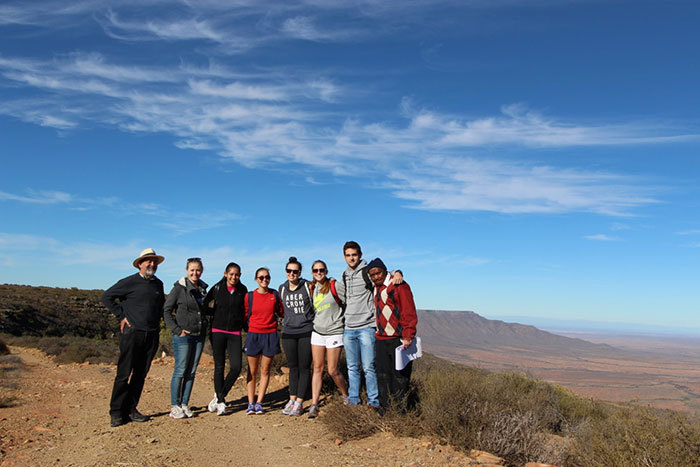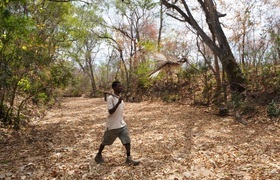Field trip sheds light on pre-industrial Cape
13 August 2015 | Story by Newsroom
UCT historical studies honours students swapped the dusty archives for a pair of walking boots and sunscreen after the first semester to explore the Onder-Bokkeveld, an area of the Cape they had studied in their course "Pre-Industrial Western Cape Archeology and History".
Led by Professor Nigel Penn, this trip has become a key feature of the course and a much-anticipated event by the students who elect to take it.
Penn explained the importance of such a field trip: "In my opinion, an understanding of history should begin with an appreciation of the environment in which it took place. The landscape and terrain of a region provide the crucial backdrop to events and enable one to reconstruct, imaginatively but more accurately, how individuals in the past interacted with their world."
The class of 2015 visited the small town of Nieuwoudtville, which borders the Western and Northern Cape. Most tourists visit this town during the flower season, but the area is also steeped in a rich history of both the Khoi-San and the early settlers who once lived here.
The pre-industrial Cape
And it was only with the help of local residents that the historical significance of the area was revealed to the students. They also interacted with a local NGO, Indigo, and a farming co-operative that produces fair-trade organic rooibos tea.
They were shown the important features of the landscape that are the last visual markers of pre-industrial life in the Cape – and one of the highlights was seeing Khoi-San rock art found in the area. The rock art showed dancing men and women, elephants and lions, giving a brief glimpse into a way of life that has since been lost to the area.
The students were also fortunate enough to be shown the old wagon routes over the steep mountain passes as well as the original farmhouses established in the area by early pioneering settler families – some of whose descendants still work the farmland today.
Student Hayley Hazel found the first-hand experience of what life was like on the frontier particularly useful.
"The frontier has played such an important role in South African history and thus to get the chance to see the vast landscape and challenging living conditions helped to put that all in perspective and gave me a far greater understanding of what life must have been like out on the frontier," said Hazel.
Fellow student Lauren White said the experience was multi-dimensional.
"I came to the realisation that the things which we study are not stagnant but are constantly being shaped and constructed. The theoretical is based on the lived; although history refers to the past it is not disconnected from the present. History is shaped and being shaped by the living," said White.
But the trip was not only useful intellectually. As the academic world of individual scholarship is so prone to isolation, the trip, as Lauren Palmer recognised, was important because "as a group we bonded and really were able to embrace this field of study for which we all have a passion".
Story by Emily Bate. Photo supplied.
 This work is licensed under a Creative Commons Attribution-NoDerivatives 4.0 International License.
This work is licensed under a Creative Commons Attribution-NoDerivatives 4.0 International License.
Please view the republishing articles page for more information.










